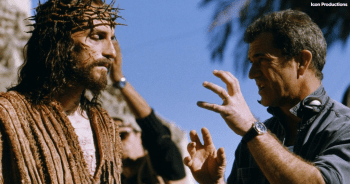When he was first approached to play in “Father Stu,” a Mark Wahlberg film about a boxer-turned-priest, Mel Gibson admitted that he was skeptical. The 66-year-old Academy Award winner told the Christian Post, “It didn’t sound like it would work.” However, reading the script got him hooked on the movie. “I read the screenplay, and it made me laugh, and then it was emotionally very effective,” he said. “This one smelled good, and it looked good, and it was great, it was funny. It was a film that wasn’t preaching to the choir, and it wasn’t over saccharin and just had a lot of a big splash of reality in it.”
“Father Stu,” which hit theatres on April 13, is based on the true story of amateur boxer Stuart Long (Mark Wahlberg), who moves to Los Angeles dreaming of stardom. He meets a Catholic Sunday School teacher, Carmen (Teresa Ruiz), and begins attending church to win her over. However, after surviving a terrible motorcycle accident, Stu begins to rethink his life.
Determined to help others, he decides to become a Catholic priest, ignoring the reservations of church officials and his agnostic parents (Gibson and Jacki Weaver). Stu seeks to follow God’s calling on his life despite a devastating health diagnosis and other challenges, inspiring countless others.
Gibson stars as Bill Long, Stu’s long-estranged, foul-mouthed father. A truck driver, Bill is battling his demons, having fled to Los Angeles after Stu’s younger brother died. Initially, he and Stu have an antagonistic relationship; one defined by resentment, anger, and bitterness. But their story arch, Gibson said, demonstrates that redemption is possible for even the most flawed people.
Gibson said, “I was kind of being the devil’s advocate here in the film because I’m the agnostic guy who’s like, giving [Stu] hell for doing what he’s doing,” he said. “The beauty of that is that he’s eventually won over by the purity of his son and how it cuts through all the judgmental baloney, and it just goes straight to the heart, straight to the soul.” “There’s a transformation needed in all of us on a daily basis, I might add,” the actor said. “I wake up pretty grumpy, and I’ve got to find ways to not be that way. It’s a continuing struggle.”
Gibson shared that watching the film with an audience made him realize how impactful the movie was, saying that he got choked up. Gibson is no stranger to films that both challenge and uplift audiences. In 2004, he produced, co-wrote, and directed “The Passion of the Christ” starring Jim Caviezel. The film, nominated for three Academy Awards, had a worldwide box office gross of $610 million, making it the highest-grossing R-rated film and highest-grossing independent film in history.

Like “The Passion of the Christ,” “Father Stu” is rated R. With language and some crude jokes littered throughout the film, “Father Stu” is not a faith-based film — something Gibson has repeatedly stressed. Yet, it’s rife with religious imagery and biblical themes. Redemption, forgiveness, and grace are woven throughout the actor’s storyline, described as “expertly penned.”
Unlike his “Father Stu” character, he is a man of faith. Gibson said he’s aware of his flaws and need for grace. The “Passion of the Christ” director reflected on how “Father Stu” doesn’t paint a rosy picture of the Christian life; instead, it highlights God’s sovereignty and grace amid suffering. With decades of life under his belt, Gibson is the first to acknowledge he hasn’t always gotten it right — but encouraged the next generation to “stick” to their “convictions” even though it’s “hard” in an increasingly polarized society. Father Stu, who died in 2014, exemplified this truth in a tremendous way.


